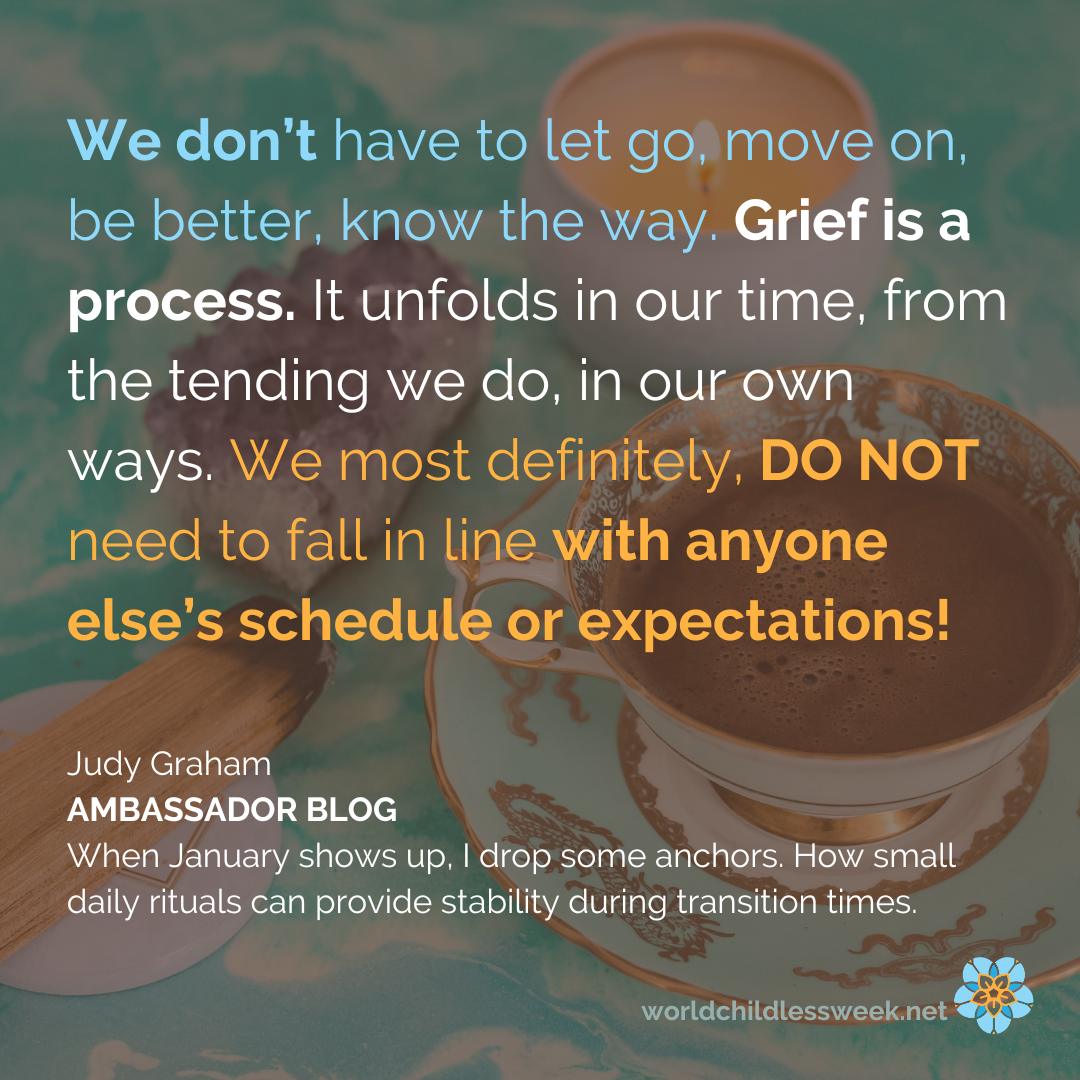Judy Graham
World Childless Week Ambassador
How small daily rituals can provide stability during transition times.
This year marks a decade since I came to terms with the permanence of my childlessness and the ending of an important intimate relationship. And somehow, turning the page on the calendar at the start of another year, seems to pull on the strings of the past.
When I pause to notice, it is heartening to acknowledge how much has changed in that time. How much healing, growing and awareness I’ve developed. How much the childless community has grown. Ten years ago, I could never have imagined that I’d be in this place now – being part of a movement and supporting others. In the midst of heartbreak, it was quite literally a challenge just to get through each day, and the idea of planning ahead was unfathomable. I’m proud of finding my way out of the dark, creating my own path as a childless woman, and being in a place to offer support; and I’m so very grateful for all those who’ve shone their lights to guide and support me.
Even though the grief I carry is so much lighter and quieter now, I also notice that January comes with an undercurrent of mixed emotions.
January is a transition month.
It’s a time when we turn the calendar, recover from ‘the festive season’, come back from holidays, get new diaries, field the inevitable new year questions. Whether we bring our awareness to it intentionally or not – the vibrations of past and future are in the airwaves during January.
There can be such a sense of expectation around letting go and moving forward. Things that are unsettling and tough when we’re navigating childlessness and grief. There are things we may not want, need, or be ready, to let go of. What we’re holding onto might feel a little tenuous, and it might feel like we’re in limbo. We may feel resistance, uncertainty, or fears about the future. And they’re all completely normal as we process grief and adapt to a life we didn’t choose or expect. We don’t have to let go, move on, be better, know the way. Grief is a process. It unfolds in our time, from the tending we do, in our own ways. We most definitely, do not need to fall in line with anyone else’s schedule or expectations!
Some of us may be raring to go in January. It may be a relief to be noticing change and stepping into a new year feeling stronger and braver. And if that’s you, notice that energy and embrace it. Setting intentions, and planning ahead, can move us towards our goals in positive and purposeful ways.
It’s the assumption that we need to have things mapped out, that we need to be moving forward, that our lives will, or should, fit neatly into the pre-existing conventional patterns, or other people’s timelines.
What’s ahead for you this year?
What are your plans this year?
Don’t you think it’s time to move on?
Oh, are you still upset about that?
Have you thought of…
Comments (and assumptions) like this hurt and they poke those tender spots that are sensitive to judgement, pressure, and expectation. It can leave us with a feeling of not keeping up, failing, or not doing things ‘right’. You are not failing because you’re processing and working things out. You’re dealing with pain and navigating one of the most difficult experiences in your life. And you can only do it your way, at your pace.
If I had the children and family life I expected, and dreamed of, the year ahead would have been mapped out around school holidays, and family events. There’d be some structure to provide a sense of order and certainty. Perhaps over time that would have felt restrictive and repetitive… I’ll never know. I do know that in the early years of grief, looking ahead into the new year could feel shapeless, spacious and empty (other than work). And, it was unsettling and upsetting until I healed a bit more and found my own pattern, and my own markers, that give shape to the year. It’s now an unexpected joy to be able to sit with some uncertainty and have such autonomy and flexibility in my life.
When January rolls around, if I notice the strings of grief, expectation, and my non-conformity being pulled, I try to pause and connect with the day-to-day things that are familiar, soothing, and grounding. Rather than looking too far forward, I come back to basics.
Daily rituals can serve as anchors that provide stability, a sense of control, and a source of comfort during uncertain times.
Daily rituals aren’t necessarily daily, they might be daily, weekly, monthly, or spontaneous as the need/want arises in you. Rituals that work well as anchors give you a feeling of relief and wellbeing – a sense of coming home to you.
Here are some examples (not an exhaustive or prescriptive list):
Your morning routine
A gratitude practice
Daily planning
Reading time
Connection rituals – eg coffee dates, messaging, calls with friends & loved ones
Self- care practices – eg a warm bath, long shower, skin care routine, massage
Journaling time
Meditation, mindful breathing, or relaxation time
Nature connection
Movement, exercise – eg walks, yoga, dancing, swimming
Time with pets or animals
Affirmations
Digital detox time
Bedtime routine
There’s no right or wrong here. Day-to-day rituals that effectively anchor us, are usually concrete things in our lives that are associated with positive memories in both mind and body. You may have one or two anchors, or you may have multiple. Your anchors might be particular people, animals, a place, an object, or an activity that you’re able to be present with. They can help provide stability in uncertain times by:
Creating consistency
Introducing predictability and a sense of control and ease
Making space for emotional expression and healing
Fostering connection and reducing feelings of isolation
Perhaps January isn’t all about planning and lofty goals.
If January vibrates with transition and competing tensions, perhaps it can be a time for pause and self-care – for coming home to you.
How is January for you?
Can you relate to the concept of anchors and day-to-day rituals?
What are the day-to-day rituals that bring you a sense of stability, comfort and wellbeing?
Photo by Emily Bauman on Unsplash


